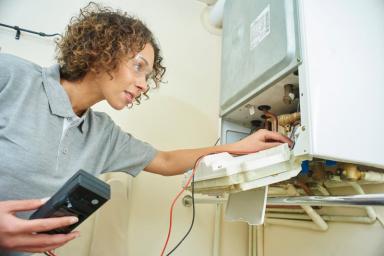Bitesize steps to decarbonising your home & reducing fuel bills

For most households, the first step to reaching a net-zero home will not be fitting a heat pump, it will be making your existing gas boiler run more efficiently. 99% of households will be able to reduce their gas consumption today with small changes that improve boiler efficiency enormously. With better operation comes longer boiler lifespans and the likelihood of avoiding an interim gas boiler replacement so that your next purchase is a heat pump. This blog introduces stepped approach to low carbon homes, so that we can reduce our carbon emissions and fuel bills every year on the way to net zero.
Contents
- Keeping to our 'carbon budget'
- Our gas boilers are wasting far too much gas
- We dispose of our boilers too quickly
- A Roadmap to net zero that can start today
- Terrible reasons consumers are given to change their boiler unnecessarily
- Get independent bespoke advice
1) Keeping to our carbon budget
We have 28 years and counting to reach net zero. With that comes a ‘carbon budget’. It’s a bit like a financial budget, but instead of having a fixed amount of money to spend, we have a fixed amount of carbon to emit. Our carbon budget is tight and requires us to reduce our carbon emissions every day of every year along the way, in other words, we cannot just gear up for a big switch over in 2050.
The Committee for Climate Change project that we’ll fit 1,000,000 heat pumps a year by 2030. On a trajectory that hits 600,000 by 2028, we will have only fitted 3 million heat pumps by the end of the decade. That leaves 19.5 million households still running on gas.
We are a gas nation and we cannot avoid it. Boilers already seem dated compared to the magic and shine of heat pumps, with their mysterious use of air or water or earth to heat our homes. We might feel guilty about their operation, but they are going to be with us for at least 15 years so reducing our gas consumption has an important part to play in keeping to our carbon budget.
2) Our boilers are wasting far too much gas
Studies have found that most condensing gas boilers are not condensing, i.e. do not reach their efficiency potential. We know this is due to weak building regulation and low standards of installer competency. An educated guess, based on recent studies, is that condensing gas boilers are operating 10-25% under their A-rated efficiency. In other words, they are B-E rated in the home. Enough wasted energy to heat Wales annually.
3) We dispose of our boilers too quickly
The unnecessarily large carbon footprint resulting from gas boiler inefficiency is made worse by the over replacement of gas boilers. Boilers are routinely scrapped at 7 years and sometimes less. Even manufacturers put life spans at a conservative 10-15 years. According to an EU report, boilers should last 22 years.
Our analysis of boiler sales v boiler stock (i.e. the number of homes with a gas boiler per country) found that in the UK we replaced 7.6% of our gas boiler stock annually (1.75 million boilers). Compared to Germany which replaces 5.6% of its stock.
The difference sounds small, but if we replaced 5.6% of our boilers per year instead of 7.6%, we’d fit 484,000 fewer boilers per annum. It is clear we have a boiler replacement industry, not a boiler efficiency industry or a boiler longevity industry. For those customers approaching us with current model boilers and untapped efficiency potential, our advice is to stop and audit the current system. Most condensing boilers can be made to run more efficiently and with better operation comes longer lifespans.
4) Roadmap to net zero that start today.
The UK has a ‘roadmap’ to reach net zero by 2050 whereby as a nation we reduce carbon emissions every day of every year across all sectors, including buildings, transport and industry. As domestic dwellings contribute 15-20% of carbon emissions, households also need a roadmap to net zero. As each household is different, that roadmap needs to be tailored to the requirements of the property and the occupier(s).
With heat pumps costing £8-20K, and most homes needing better insulation to reduce the size of heat pump needed (and therefore the installation cost), the first step in the roadmap is not to jump to a new heating system. Such a large step is likely to prevent any decarbonisation action, so better to encourage households to take the bitesize steps they can afford. Our carbon budget dictates we cannot wait for heat pump prices to come down or a national programme of retrofit insulation to begin. Certainly, the signs that either might happen soon are not visible. We must start with the easy wins that everyone can do today.
5) Terrible reasons people are given to change their boiler unnecessarily
We hear lots of reasons why consumers are advised to change their boiler prematurely and I think it’s just useful to cover them briefly so that you question the advice you are given and avoid an unnecessary replacement.
Parts are no longer available
It is true that many parts are discontinued on all boilers, but they tend to be non-essential and rarely need changing, but this is not made clear. Many boilers up to 20 years old have the main parts available that will get your boiler going again.
The boiler is beyond economic repair
It would have to be multiple components failure for this to be justified, We often hear the repair is £300-£400 and replacement £2,000 - £3,500. Repairs to a well-maintained boiler are cheaper than multiple boiler replacements over its potential 22 lifespan.
Your boiler is not efficient
A poorly fitted condensing boiler replaced with another poorly fitted condensing boiler will not offer a huge efficiency lift, better to clean the heat exchanger of your existing boiler and invest instead in the overall efficiency of the system.
It is not a good make of boiler
Installers can be very brand loyal, but as less than 1% are knowledgeable enough to know the difference between and high-tech boiler and low-tech boiler, they can rarely substantiate their recommendations and we have seen really good boilers replaced with the lowest of low-tech boilers out of brand loyalty.
Boiler only lasts 10 years
This is just not true and it seems to me that boiler warranty lengths have become tied to boiler life expectancy, so that when the warranty expires it’s time for a new boiler, when this is not the case. An EU study found that boilers last 22 years.
You need a hydrogen ready boiler
Most boilers are only hydrogen-mix ready, no current boilers are ready for a full switch over if that ever becomes viable.
6) Get independent and bespoke advice
Step 1 (a) is a really easy win for all combi boiler households. For each of the other steps, including boilers with a hot water cylinder, the advice is boiler specific. We can help. Our Mini Roadmap will give you the correct set up for your boiler and a referral to an installer working to our efficiency standard. Our Full Roadmap will impartially specify bitesize steps that suit you and your home.

Get bespoke help for your home
More reads...
What will replace gas boilers in the future?
A recent energy white paper proposed for gas boilers to be phased out by mid-2030s and 2025 in new build homes. We explore what will replace them.
Air source heat pump ultimate guide
We take a deep dive into air source heat pumps - how they work, what they cost, what sizes they are available in and grants available.
